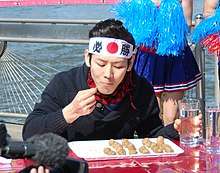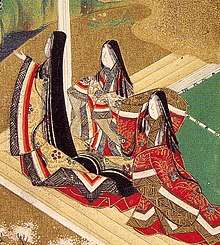Hachimaki
A hachimaki (鉢巻, "helmet-scarf") is a stylized headband in Japanese culture, usually made of red or white cloth. They are worn as a symbol of effort or courage by the wearer, especially by those in the military, or to simply keep sweat off of one's face.

History
The origin of hachimaki is uncertain. The most common theory states that they originated as headbands worn by samurai to line their heads with cloth. This was to stop cuts from the helmet and make wearing the helmet more comfortable.
Kamikaze pilots wore hachimaki before flying to their deaths.
Styles
Hachimaki are typically decorated with inspirational slogans, such as (see below) "Nippon Ichi" (日本一, "the best of Japan"), and with the rising sun motif in between the kanji.
Common slogans
Some common slogans include:
- Ichiban (一番, number one)
- Goukaku (ごうかく,合格 success)
- Hisshō (必勝, determined to win)
- Nihon/Nippon (日本, Japan)
- Kamikaze (神風, divine wind)
- Toukon (とうこん,闘魂 fighting spirit)
Gallery
 Hachimaki sold in a store
Hachimaki sold in a store Kamikaze hachimaki
Kamikaze hachimaki Another kamikaze hachimaki
Another kamikaze hachimaki Kamikaze wearing hachimaki
Kamikaze wearing hachimaki Kōshirō Matsumoto IV as Sakanaya Gorobee by Sharaku
Kōshirō Matsumoto IV as Sakanaya Gorobee by Sharaku.jpg) The winner of a 2011 WTCC race wears a Hachimaki
The winner of a 2011 WTCC race wears a Hachimaki
References
- "Jisho.org: Japanese Dictionary". jisho.org.
- "Jisho.org: Japanese Dictionary". jisho.org.
